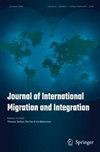声援在匈牙利的乌克兰流离失所者:态度和做法
IF 1.8
Q3 DEMOGRAPHY
Journal of International Migration and Integration
Pub Date : 2023-11-04
DOI:10.1007/s12134-023-01096-8
引用次数: 0
摘要
摘要本文探讨了匈牙利公民社会在乌克兰战争背景下的态度,团结的积极分子,以及与欢迎流离失所者相关的一般社会氛围。根据2022年夏天的一项人口调查,这篇论文描绘了一幅矛盾的画面。首先,它突出了民间团结在实际参与和表达态度方面的非凡势头和动员力量。与此同时,研究结果也揭示了公民团结的局限性和脆弱性,即它暴露于民粹主义政治话语,这些话语根据既得利益珍视或谴责道德经济援助,以及它植根于对公民个人资源(可支配时间和物质手段)的新自由主义依赖,以及在分担人道主义支持负担方面的显著不平等。所有这些都反映出,在我们进行调查时,人们对团结一致的共识和相对均匀的态度,并没有完全转化为实际的帮助,给那些已经承担了沉重照顾责任的人增加了负担。根据这一发现,我们强调将团结作为一种态度和实践的复杂关系进行探索的重要性;此外,我们强调有必要在调查人口对移民群体和类别的态度时包括照顾的观点。我们的结果是从多维逻辑回归模型的应用中得出的,该模型基于一项涉及匈牙利成年人口代表的1000名受访者的统计调查数据。本文章由计算机程序翻译,如有差异,请以英文原文为准。
Solidarity with Displaced People from Ukraine in Hungary: Attitudes and Practices
Abstract The paper explores the attitudes of Hungarian civil society in the context of the war against Ukraine, the active agents of solidarity, and the general social atmosphere associated with welcoming displaced people. Based on a population survey from the summer of 2022, the paper draws an ambivalent picture. First, it highlights the exceptional momentum and mobilising power of civil solidarity both in terms of practical involvement and expressed attitudes. At the same time, the results also reveal the limits and vulnerabilities of civil solidarity—namely, its exposure to populist political discourses which cherish or condemn moral economies of assistance according to vested interests, as well as its embeddedness in a neoliberal reliance on citizens’ individual resources (disposable time and material means), and the salient inequalities in sharing the burdens of humanitarian support. All this reflects that the consensus and relative evenness of solidarity attitudes at the time of our survey were unevenly translated into practical help, burdening those already heavily charged with care responsibilities. With this finding, we underline the importance of exploring solidarity as a complex relationship of attitudes and practices; also, we highlight the need to include the perspectives of care in inquiries of the population’s attitude towards immigrant groups and categories. Our results are drawn from the application of multi-dimensional logistic regression models based on data from a statistical survey involving 1000 respondents representative of Hungary’s adult population.
求助全文
通过发布文献求助,成功后即可免费获取论文全文。
去求助
来源期刊
CiteScore
2.70
自引率
7.70%
发文量
82
期刊介绍:
The Journal of International Migration and Integration (JIMI) is a multidisciplinary peer-reviewed scholarly journal, which publishes original research papers, policy discussions and book reviews that enhance the understanding of immigration, settlement and integration and that contribute to policy development. The Journal of International Migration and Integration consistently covers a wide array of subject areas, including labor market integration, refugee status in various nations, adaptation strategies of immigrants in industrialized settings, racial and gender variations in migration, the role of social work in the integration of new citizens, and retention of ethnic and older national identities in new environments. These are issues of concern throughout the world. The journal looks at the social world with a fresh vision enhanced by the basic and applied social sciences. JIMI welcomes papers based on original research, critital policy debates and comparative analyses. Submissions and subscriptions are open to all.

 求助内容:
求助内容: 应助结果提醒方式:
应助结果提醒方式:


